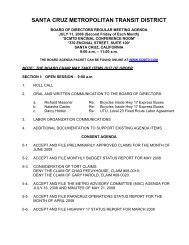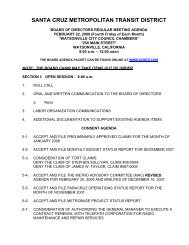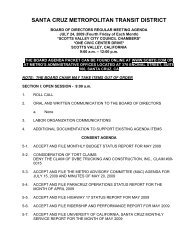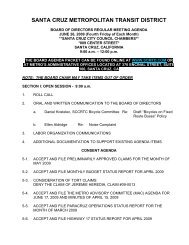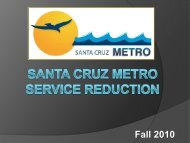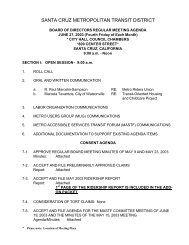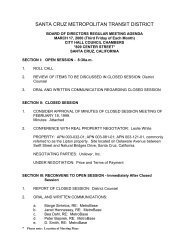- Page 1 and 2:
SANTA CRUZ METROPOLITAN TRANSIT DIS
- Page 3 and 4:
Regular Board Meeting Agenda Februa
- Page 5 and 6:
Regular Board Meeting Agenda Februa
- Page 7 and 8:
Additions to the Agenda February 27
- Page 9 and 10:
Regular Board Meeting Agenda Februa
- Page 11 and 12:
Regular Board Meeting Agenda Februa
- Page 13 and 14:
Page 1 of 1 R. Paul Marcelin-Sampso
- Page 16 and 17:
February 5,2004 Board of Directors
- Page 18 and 19:
SANTA CRUZ METROPOLITAN TRANSIT DIS
- Page 20 and 21:
Minutes- Board of Directors January
- Page 22 and 23:
Minutes- Board of Directors January
- Page 24 and 25:
Minutes- Board of Directors January
- Page 26 and 27:
SANTA CRUZ METROPOLITAN TRANSIT DIS
- Page 28 and 29:
Minutes- Board of Directors January
- Page 30 and 31:
Minutes- Board of Directors January
- Page 32 and 33:
Minutes- Board of Directors January
- Page 34 and 35:
Minutes- Board of Directors January
- Page 36 and 37:
Minutes- Board of Directors January
- Page 38 and 39:
Minutes- Board of Directors January
- Page 40 and 41:
Minutes- Board of Directors January
- Page 42 and 43:
i .:,; !;f: ,‘I>* 1 :; ; 1; ‘
- Page 44 and 45:
_ ..y; 7 : i, . _ /’ : 5 I :js ,
- Page 46 and 47:
,- ‘ ,I I ;. _ ! !i + ” i ;z;:L
- Page 48 and 49:
Page 1 of the Ridership Report will
- Page 50 and 51:
Service Interruption Summary Report
- Page 52 and 53:
GOVERNMENT TORT CLAIM RECOMMENDED A
- Page 54 and 55:
Metro Accessible Services Transit F
- Page 56 and 57:
Note: This meeting is held at a loc
- Page 58 and 59:
MASTF Minutes January 15, 2004 Page
- Page 60 and 61:
those unable to attend the meeting.
- Page 62 and 63:
ecommendations as well as discussio
- Page 64 and 65:
Discussion of the reports from Mr.
- Page 66 and 67:
4) Mr. LeBlanc suggested that “Ju
- Page 68 and 69:
Discussion of this proposal conclud
- Page 70 and 71:
Ms. Barbour noted: MASTF Goals for
- Page 72 and 73:
SANTA CRUZ METROPOLITAN TRANSIT DIS
- Page 74 and 75:
MONTHLY REVENUE AND EXPENSE REPORT
- Page 76 and 77:
CONSOLIDATED OPERATING EXPENSE DECE
- Page 78 and 79:
MONTHLY REVENUE AND EXPENSE REPORT
- Page 80 and 81:
13. Employee incentive program expe
- Page 82 and 83:
SANTA CRUZ METROPOLITAN TRANSIT DIS
- Page 84 and 85:
April May June 12000 10000 8000 600
- Page 86 and 87:
METRO ParaCruz Eligibility Determin
- Page 88 and 89:
HIGHWAY 17 - DECEMBER 2003 December
- Page 90 and 91:
Board of Directors Page 2 • Stude
- Page 92 and 93:
UCSC Faculty / Staff Billable Trips
- Page 94 and 95:
Board of Directors Board Meeting of
- Page 96 and 97:
PROFESSIONAL SERVICES CONTRACT FOR
- Page 98 and 99:
5. COMPENSATION 5.01 Terms of Payme
- Page 100 and 101:
SANTA CRUZ METROPOLITAN TRANSIT DIS
- Page 102 and 103:
proposals, unless a longer time per
- Page 104 and 105:
PART II GENERAL INFORMATION FORM (T
- Page 106 and 107:
BUY AMERICA PROVISION (Only for Con
- Page 108 and 109:
CONTRACTOR DBE INFORMATION CONTRACT
- Page 110 and 111:
All accounting records are computer
- Page 112 and 113:
Mail or deliver to: Santa Cruz Metr
- Page 114 and 115:
PART IV GENERAL CONDITIONS TO THE C
- Page 116 and 117:
Contractor is not entitled to damag
- Page 118 and 119:
9. NO DISCRIMINATION In connection
- Page 120 and 121:
13.10.04 Contractor shall be solely
- Page 122 and 123:
PART V PROFESSIONAL SERVICES CONTRA
- Page 124 and 125:
District shall compensate Contracto
- Page 126 and 127:
PART VI FEDERAL TRANSIT ADMINISTRAT
- Page 128 and 129:
Contractor shall recognize mandator
- Page 130 and 131:
12.1 Policy It is the policy of the
- Page 132 and 133:
(b) "Records" means any item, colle
- Page 134 and 135:
(iii) a change in the officer(s), e
- Page 136 and 137:
An Offeror may seek FTA review of t
- Page 138 and 139:
. SANTA CRUZ METROPOLITAN TRANSIT D
- Page 140 and 141:
Peter C. Brown, CPA Burton H. Armst
- Page 142 and 143:
SANTA CRUZ METROPOLITAN TRANSIT DIS
- Page 144 and 145:
Statement of Net Assets A compariso
- Page 146 and 147:
SANTA CRUZ METROPOLITAN TRANSIT DIS
- Page 148 and 149:
SANTA CRUZ METROPOLITAN TRANSIT DIS
- Page 150 and 151:
SANTA CRUZ METROPOLITAN TRANSIT DIS
- Page 152 and 153:
NOTE 1 - OPERATIONS AND SUMMARY OF
- Page 154 and 155:
NOTE 1 - OPERATIONS AND SUMMARY OF
- Page 156 and 157:
NOTE 3 - RECEIVABLES Receivables at
- Page 158 and 159:
NOTE 6 - CAPITAL GRANTS The Distric
- Page 160 and 161:
NOTE 11 - DEFINED BENEFIT PENSION P
- Page 162 and 163:
NOTE 15 -TRANSPORTATION DEVELOPMENT
- Page 164 and 165:
SANTA CRUZ METROPOLITAN TRANSIT DIS
- Page 166 and 167:
SANTA CRUZ METROPOLITAN TRANSIT DIS
- Page 168 and 169:
Peter C. Brown, CPA Burton H. Armst
- Page 170 and 171:
Peter C. Brown, CPA Burton H. Armst
- Page 172 and 173:
Peter C. Brown, CPA Burton H. Armst
- Page 174 and 175:
SANTA CRUZ METROPOLITAN TRANSIT DIS
- Page 176 and 177:
Form990-EZ(2002) Santa Cruz Civic I
- Page 178 and 179:
Schedule A (Form 990 or 990-W) 2002
- Page 180 and 181:
Santa Cruz Civic Improvement Carp o
- Page 182 and 183:
Schedule A (Form 990 or 990-EZ) 200
- Page 184 and 185:
2002 Federal Statements Client 7404
- Page 186 and 187:
Santa Cruz Civic I&rovement Corp 77
- Page 188 and 189:
c-s MAIL TO: Registry of Charitable
- Page 190 and 191:
BROWN ARMSTRONG PAULDEN McCOWN STAR
- Page 192 and 193:
BROWN ARMSTRONG PAULDEN MCCOWN STAR
- Page 194 and 195:
j Santa Cruz Metropolitan Transit D
- Page 196 and 197:
Santa Cruz Metropolitan Transit Dis
- Page 198 and 199:
TECHNICAL AUDIT A.PPROACH e3kd [~~~
- Page 200 and 201:
Santa Cruz Metropolitan Transit Dis
- Page 202 and 203:
Santa Cruz Metropolitan Transit Dis
- Page 204 and 205:
Santa Cruz Metropolitan Transit Dis
- Page 206 and 207:
Santa Cruz Metropolitan Transit Dis
- Page 208 and 209:
Santa Cruz Metropolitan Transit Dis
- Page 210 and 211:
TECHNICAL AUDIT A.PPROACH e3kd [~~~
- Page 212 and 213:
Santa Cruz Metropolitan Transit Dis
- Page 214 and 215:
Santa Cruz Metropolitan Transit Dis
- Page 216 and 217:
Santa Cruz Metropolitan Transit Dis
- Page 218 and 219:
Santa Cruz Metropolitan Transit Dis
- Page 220 and 221:
I Santa Cruz Metropolitan Transit D
- Page 222 and 223:
Resume of Steven R. Starbuck, CPA ,
- Page 224 and 225:
Resume of Thomas M. Young, CPA Audi
- Page 226 and 227:
Resume of Adriana C. Belt Staff Acc
- Page 228 and 229:
Santa Cruz Metropolitan Transit Dis
- Page 230 and 231:
‘&Vi ‘146 l#&llj; F e b 0 4 0 4
- Page 232 and 233:
Signed on _________________________
- Page 234 and 235: Board of Directors Board Meeting of
- Page 236 and 237: Signed on _________________________
- Page 238 and 239: Signed on _________________________
- Page 240 and 241: Signed on _________________________
- Page 242 and 243: Board of Directors Board Meeting of
- Page 244 and 245: I Via Certified Mail & Facsimile (2
- Page 246 and 247: Signed on _________________________
- Page 248 and 249: Signed on _________________________
- Page 250 and 251: Board of Directors Page 2 Call stop
- Page 252 and 253: Statistical Summary \ , \ Total num
- Page 254 and 255: ROUTE OPERATOR BUS # DATE CALLS MAD
- Page 256 and 257: ACQUISITION AND RELOCATION ASSISTAN
- Page 258 and 259: 10. All payments due for land, impr
- Page 260 and 261: SANTA CRUZ METROPOLITAN TRANSIT DIS
- Page 262 and 263: Exhibit A 1. Surf City Produce 120
- Page 264 and 265: SANTA CRUZ METROPOLITAN TRANSIT DIS
- Page 266 and 267: A Attachment - I LI s >, 2 L r T :
- Page 268 and 269: SANTA CRUZ METROPOLITAN TRANSIT DIS
- Page 270 and 271: Board of Directors Board Meeting of
- Page 272 and 273: SANTA CRUZ METROPOLITAN TRANSIT DIS
- Page 274 and 275: Highway 17/AMTFUK Weekday Southboun
- Page 276 and 277: Board of Directors February 13, 200
- Page 278 and 279: ATTACHMENT B Santa Cruz hIETR0 Hiph
- Page 280 and 281: Board of Directors Page 2 One addit
- Page 282 and 283: C. Paratransit Service Regular Para
- Page 286 and 287: Board of Directors Page 4 Blended (
- Page 288 and 289: Board of Directors Page 6 V. ATTACH
- Page 290 and 291: Board of Directors Page 8 4. Inform
- Page 292 and 293: These costs represent an increase o
- Page 297 and 298: SANTA CRUZ METROPOLITAN TRANSIT DIS
- Page 299 and 300: , (...., SANTA CRUZ METROPOLITAN TR
- Page 301 and 302: ~~~~A SEASIDE COMPANY February 3,20
- Page 303 and 304: Board of Directors Page 2 As part o
- Page 305 and 306: . EXAMPLE #I METRO is currently inv
- Page 307 and 308: SANTA CRUZ METROPOLITAN TRANSIT DIS
- Page 309 and 310: Snnta Cruz Metropolitan Transit Dis
- Page 311 and 312: FEE 17 2004 4:16PM HP LASERJET 3200
- Page 313 and 314: SANTA CRUZ METROPOLITAN TRANSIT DIS
- Page 315 and 316: Drafted for 9/26/03 Revised for 10/
- Page 317 and 318: The term of membership of each Comm
- Page 319 and 320: action on items not appearing on th
- Page 321 and 322: Committee member, the Secretary/Gen
- Page 323 and 324: Are You Aware Of Any Conflicts of I
- Page 325 and 326: METRO NEEDS YOU!!! METRO IS FORMING
- Page 327 and 328: SANTA CRUZ METROPOLITAN TRANSIT DIS
- Page 329 and 330: POLICIES AND PROCEDURES FOR PROPERT
- Page 331 and 332: HOW DOES AN APPRAISER DETERMINE THE
- Page 333 and 334: Ordinarily, the owner is then permi
- Page 335 and 336:
CODE OF CIVIL PROCEDURE ARTICLE 6 (
- Page 337 and 338:
SOME GENERAL QUESTIONS How will I k
- Page 339 and 340:
the estimated cost of moving the pr
- Page 341 and 342:
2. must be unable to relocate witho
- Page 343 and 344:
SANTA CRUZ METROPOLITAN TRANSIT DIS
- Page 345 and 346:
SANTA CRUZ METROPOLITAN TRANSIT DIS
- Page 347 and 348:
Board of Directors Board Meeting of
- Page 349:
ATTACHMENT A RANKING OF CONSTRUCTIO



